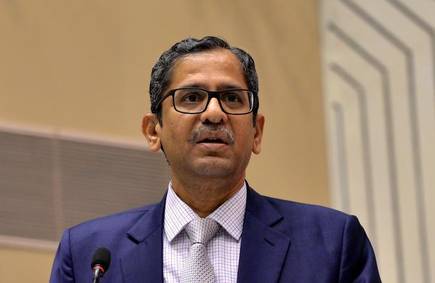Chief Justice of India (CJI) N.V. Ramana disapproved with media reports on Wednesday which claimed that the Supreme Court Collegium had recommended nine names for judicial appointments to the apex court.
Reports had claimed that the collegium had finalised nine names, including three women judges. One of them, Justice BV Nagarathna of Karnataka High Court having a high chance to become India’s first ever woman CJI in 2027. Other two women judges were Justice Hima Kohli of the Telangana High Court and Justice Bela Trivedi of the Gujarat High Court. The reports were published by some newspapers and legal news portals which speculated a historic moment for India with appointment of Justice BV Nagarathna.

According to The Hindu, the CJI said, “Today’s reflections in some sections of the media, pending the process, even before formalising the resolution is counter-productive. There were instances of deserving career progression of bright talents getting marred because of such irresponsible reporting and speculation. This is very unfortunate and I am extremely upset about it.”
The CJI was heading a Ceremonial Bench convened on the occasion of Justice Navin Sinha’s retirement.
“You are all aware we need to appoint judges to this court. The process is ongoing. Meetings will be held and decisions will be taken. The process of appointment of judges is sacrosanct and has certain dignity attached to it. My media friends must understand and recognise the sanctity of this process. As an institution, we hold the freedom of media and the rights of individuals in high esteem,” added Chief Justice Ramana.
The CJI also commended journalists who had shown restraint. He said, “I must also place on record the tremendous amount of maturity and responsibility displayed by the majority of senior journalists and media houses in showing restraint and not speculating on such a serious matter. Such professional journalists and ethical media are the real strength of the Supreme Court in particular and democracy in general. You are part of our system. I expect all the stakeholders to uphold the integrity and dignity of this institution.”
What is a Collegium?
The Collegium System is a system through which appointments and promotion of the judges of the Supreme Court are decided. It is led by a forum consisting of the Chief Justice of India along with four of the senior-most judges of the Supreme Court.
Procedure of appointing CJI
It’s surprising that the Constitution of India does not have any provision for criteria and procedure for appointing the CJI. Article 124(1) of the Indian Constitution says there “shall be a Supreme Court of India consisting of a Chief Justice of India”. Further, Article 126 deals with the appointment of an acting CJI.
In the absence of a constitutional provision, the procedure relies on custom and convention.
What is the convention?
When the incumbent CJI retires, as every Court judges retire at the age of 65, the senior most judge in the SC becomes the CJI. Seniority, here, is not defined by age, but by the number of years an individual has been serving as a judge of the apex court.
What is the procedure?
The procedure to appoint the next CJI is put out in the Memorandum of Procedure (MoP) between the government and the judiciary. It is initiated by the Law Minister of India seeking the recommendation of the outgoing CJI at the appropriate time, which is near to the date of retirement of the incumbent CJI. The CJI then sends his recommendation to the Law Ministry and in the case of any qualms, the CJI can consult the collegium regarding the fitness of an SC judge to be elevated to the post. After receiving recommendation from the CJI, the law minister forwards it to the Prime Minister who then advises the President on the same. The final procedure includes the President administering the oath of office to the new CJI.
Reference:
Picture Credit:





















































































